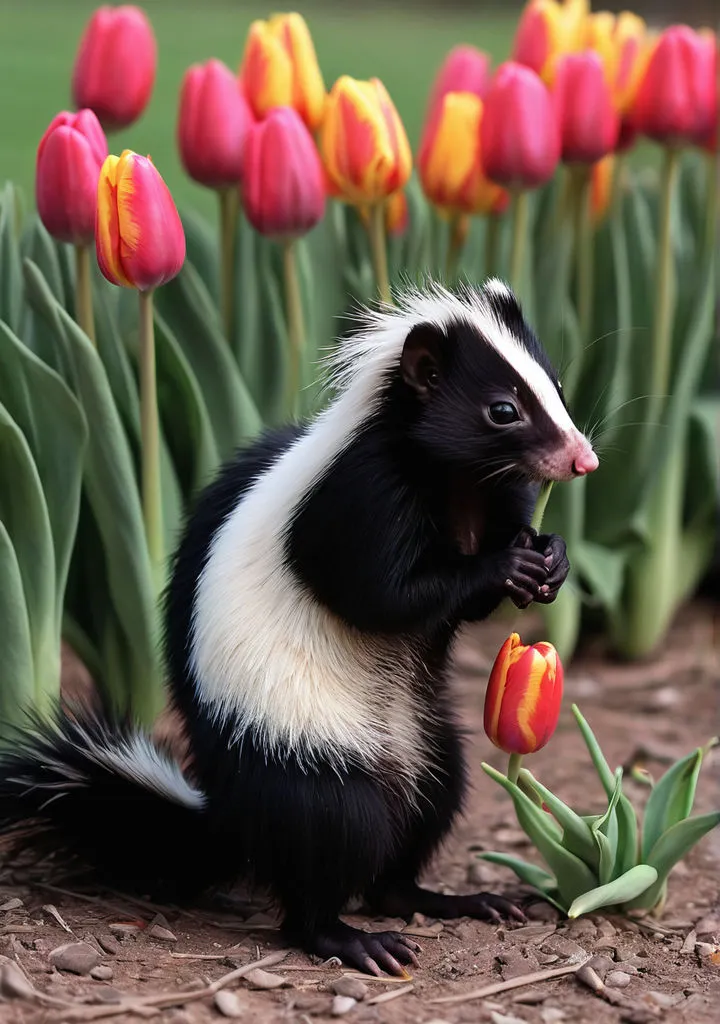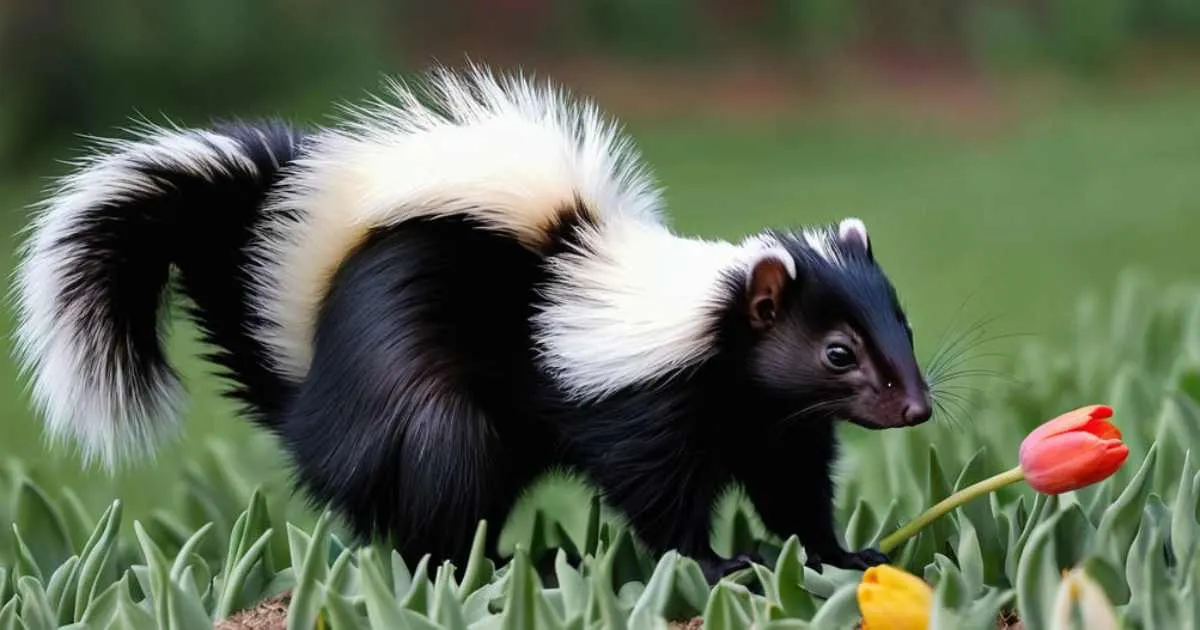Do Skunks Snack on Tulips? What Experts Say
Last updated on September 30th, 2024 at 09:04 am
Having a pet skunk and studying wildlife has taught me that skunks are not too picky about their food. They might even eat tulips if there’s nothing else around. Skunks typically munch on insects and small animals, but they won’t say no to plants and flowers like tulips when they’re hungry. If you’re looking to keep your garden safe from these furry foragers, read on to discover how to deter skunks from your beloved tulips
Skunks In Your Garden
Gentle yet surprising visitors, skunks might appear in your garden. While their striped coats are striking, their potential to harm your plants, including tulips, can be a matter of concern. Understanding their dietary choices is key to protecting your floral investments.

The Truth About Their Diet
Skunks are omnivores, meaning they eat both plants and animals. Regarding tulips, they might not be the skunk’s first choice. However, skunks don’t shy away from plant bulbs when other food is scarce.
- Worms and insects take the top spot on a skunk’s menu.
- Fruits and nuts often satisfy their sweet tooth.
- Small animals like rodents offer a high-protein snack.
- Tulip bulbs can serve as an occasional treat.
Habits That Bring Skunks To Your Yard
Creating a skunk-friendly environment often invites these creatures over. Let’s explore what might attract them:
| Factors | Descriptions |
|---|---|
| Food | Accessible compost piles, garbage, or pet food are an open invitation. |
| Shelter | Dense foliage, woodpiles, and decks provide perfect hideouts. |
| Water | Birdbaths, leaky hoses, or ponds make your yard a hydration station. |
Tulip Temptations
Welcome to the colorful world of tulips, where beauty meets vulnerability. This section delves into one of the lesser-known threats to these spring marvels: skunks. Discover why these striped mammals may target your treasured tulips and learn how to shield them during peak risk periods.
Why Tulips May Appeal To Skunks
Tulips, with their vibrant hues and tender bulbs, inadvertently beckon a variety of garden dwellers, including skunks.
- Edible Bulbs: Skunks dig for the protein-rich tulip bulbs.
- Bright Colors: The flowers’ colors suggest a potential food source.
- Soft Soil: Tulips often grow in soil that’s easy for skunks to disturb.
Seasonal Risks For Tulip Owners
During certain times of the year, tulip enthusiasts must be extra vigilant:
| Season | Risk Factor |
|---|---|
| Spring | Emerging tulips attract skunks after winter scarcity. |
| Fall | Skunks prepare for winter by foraging, targeting planted bulbs. |
To protect tulips, consider creating barriers and employing safe deterrents around your garden to discourage skunks.
Skunk Behavior Explained
Understanding skunks helps gardeners protect their flowers, like tulips. Skunks are notorious for their disturbing foraging habits. They may seem mysterious, but knowing their behaviors solves the puzzle of damaged gardens.
Nocturnal Foraging Habits
Skunks are active at night. When the sun sets, they hunt for food. The darkness keeps them safe from predators. It’s also the quiet time when most humans are resting. You may not see them, but they could be near, exploring your garden after dusk.
The Quest For Grubs And Insects
Skunks have a strong appetite for insects and grubs. Their search for these critters can lead them to your tulips. They dig through the soil with their sharp claws. A skunk can leave small holes in its wake. If you find such signs, they might be the clue to a skunk’s visit. Our tulips become unintended victims.
- Grubs: Loved by skunks; not good for your flowers.
- Insects: A skunk’s snack that motivates their digging.
Protecting your tulips from skunks starts with understanding these behaviors. A garden without grubs or insects is less attractive to these nocturnal foragers. Take measures to insect-proof your garden. The goal is to keep your colorful blooms safe and skunk-free.
Preventing Skunk Visits
Curious gardeners often wonder whether their blooms attract skunks. Indeed, skunks can cause quite the upheaval in your garden, and tulips are no exception. Preventing skunk visits is vital to protect your cherished tulips from becoming a midnight snack. Let’s explore some effective strategies that can keep these striped intruders at bay.
Effective Garden Barriers
Physical barriers can deter skunks from entering your garden. Consider these options:
- Install a fence that’s at least 3 feet high and buried a foot deep.
- Use tight-fitting lids on garbage cans to avoid attracting skunks with food scraps.
- Close off any openings under porches or sheds where skunks might nest.
Combining these barriers with regular yard maintenance, such as removing fallen fruit and filling holes, will significantly reduce the appeal of your garden to skunks.
Natural Repellents To Protect Your Tulips
Nature offers its own solutions for keeping skunks away. Here are some effective natural repellents:
- Citrus peels: Scatter lemon or orange peels around your tulips.
- Motion-activated sprinklers: Skunks dislike getting sprayed with water.
- Cayenne pepper: Mix with water and spray around your garden’s perimeter.
These repellents need fresh applications regularly, especially after rain. Paying attention to your tulip beds and renewing these natural deterrents will help safeguard your flowers.
Signs Of Skunk Damage
As the Spring air fills with the fragrance of blooming tulips, gardeners often face uninvited diners. Skunks are notorious for rummaging through gardens, and tulips can fall victim to their appetites. Recognizing the signs of skunk damage early could save your colorful blooms from becoming a midnight snack.
Identifying The Culprits In Your Garden
Nighttime invaders can be elusive, yet there are clear indicators that skunks are the perpetrators. Look for small holes or patches of dug-up soil around the garden, where skunks use their sharp claws to search for grubs and insects.
Skunks also have a unique five-toed footprint which may be spotted in the dirt or mud. Distinct tracks combined with a faint musky odor provide strong evidence of their presence.
Another clue is the lack of eating precision. Skunks tend to leave behind half-eaten tulips and damaged bulbs, a sign of their less delicate foraging habits compared to other animals.
The Aftermath Of A Skunk Visit
The damage from a skunk’s visit can range from mild to severe. Skunks tend to focus on areas with high insect activity, which unfortunately may coincide with your tulip beds. The soil around these flowers will often show signs of disturbance.
- Torn leaves and stems
- Upturned bulbs
- Patches of flattened flowers from skunks trampling through the area
Additionally, bulbs may be partially or completely unearthed, leaving tulips vulnerable and potentially damaging their growth. Skunks are not subtle creatures, and their search for food often leads to noticeable garden disarray.
Mitigating Damage And Coexistence
When spring arrives, so does the challenge of keeping skunks away from your beloved tulips. Understanding these gentle creatures and their tastes can go a long way. Fortunately, it’s possible to repair skunk damage and live in harmony with local wildlife. Let’s explore some effective tactics to protect your tulip beds and foster a pleasant coexistence with skunks.
Repairing Tulip Damage Post-skunk
After a skunk visit, assessing tulip damage is key.
- Check for uprooted bulbs.
- Replant any dislodged bulbs.
- Pat down disturbed soil.
- Water the affected area gently.
Consistent care will help tulips recover. If some bulbs are beyond repair, consider replacing them. Over time, with care and attention, your tulips can return to their vibrant selves.
Harmonious Living With Wildlife
Wildlife encounters can be minimized with simple adjustments.
| Action | Benefit |
|---|---|
| Install Motion-activated Lights | Deters skunks at night. |
| Use Natural Repellents | Keeps skunks without harming them. |
| Secure Trash Bins | Removes food temptations. |
| Create Barriers | Prevents entry into tulip areas. |
Friendly coexistence with skunks is possible. Respect their habitat and make your garden less attractive to them. Share the environment considerately, without losing your precious tulips.
Exploring Skunk Diets Further
As we dive into the dietary habits of skunks, we discover how diverse their food choices are. Skunks have versatile appetites and are not afraid to chomp down on various plants and animals. This includes our beloved colorful tulips. Let’s look into the intricacies of a skunk’s diet and how it shifts throughout the year.
The Omnivore’s Seasonal Diet Changes
Skunks are true opportunistic feeders.
- In spring, they often seek insects and larvae.
- Summer introduces fruits and crops, like berries.
- Fall brings nuts and even the occasional pumpkin!
- Winter offers fewer choices, leading skunks to your tulips.
They eat according to what nature offers them.
Impact Of Urban Living On Skunk Feeding Habits
Urban environments significantly impact skunk diets.
With gardens aplenty, skunks find tulips and other ornamentals irresistible. Such exposure alters their natural feeding habits. Access to trash provides an easy, albeit unhealthy, food source.
Lack of predators and abundant resources encourage skunks to settle in these areas.
Frequently Asked Questions
What Animal Would Eat My Tulips?
Deer, squirrels, and rabbits are common animals known to eat tulips. Rodents such as voles and mice may also nibble on these flowers.
What Is Eating My Tulips At Night?
Deer, rodents, and rabbits commonly eat tulips at night. Protect your tulips with fencing or repellents to deter these animals.
What Animal Is Attracted To Tulips?
Deer and rodents like squirrels and voles are commonly attracted to tulips. These animals often dig up and eat tulip bulbs.
Conclusion
Gardeners take note: skunks might not top your list of tulip threats, but they’re opportunistic foragers. They could dig up bulbs while hunting for grubs. Protect your flowers with secure fencing and consistent soil checks. Ensuring the safety of your vibrant tulips requires vigilance and proactive measures.

